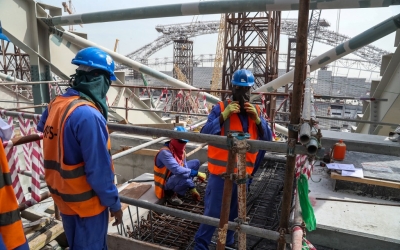Qatar: Domestic workers still face abuse despite protection laws

Domestic workers in Qatar continue to face abuse and exploitation, with employers ignoring new laws designed to protect workers, a new report has revealed.
Doha introduced a Domestic Workers Law in 2017 that limited working hours and introduced mandatory daily breaks, a weekly day off and paid holidays for live-in domestic workers.
New MEE newsletter: Jerusalem Dispatch
Sign up to get the latest insights and analysis on Israel-Palestine, alongside Turkey Unpacked and other MEE newsletters
But three years on, interviews conducted by Amnesty International with at least 105 former and current domestic workers revealed a cycle of abuse that Qatari officials had hoped to clamp down on before the nation hosted the 2022 World Cup.
The British-based rights group said that the abuses documented were fostered by a combination of factors, including lack of inspection mechanisms and aspects of Qatar's sponsorship system, which gives "employers excessive powers over their employees".
The most common form of abuse faced by the women interviewed by Amnesty was being forced to work beyond the legal 10-hour daily limit, six days a week.
Reina, 45, said that she was in a car accident because she had only had two hours' sleep after she had been overworked.
"“I went to sleep at 1am, and at 3am the 17-year-old daughter woke me up asking me to go and buy her a Red Bull," said Reina.
"Then at 5.30am I started my usual working day, washing the car and preparing to drive the kids to school… At 10pm I crashed the car into the wall."
Other forms of abuse documented by Amnesty International included enduring verbal and physical abuse. One woman said that her employer would "spit on her" and "kicked me on my back", while another worker said her boss threatened to "cut her tongue".
Five of the women interviewed by Amnesty said that they had faced sexual abuse from employers or their visiting relatives. The sexual harassment ranged from fondling to rape.
Continued impunity
Before 2018, when Qatar established the Committee for the Settlement of Labour Disputes, domestic workers had no way of lodging a complaint against their employer.
'If Qatar wants to protect domestic workers from exploitation, it needs to send a strong message to employers that labour abuses are not tolerated'
- Steve Cockburn, Amnesty International
But the committee has been plagued with delays and other issues, which workers describe as slow and stressful.
Amnesty noted that Qatar's criminal courts dealt with cases of physical and sexual abuse, but the worker's reliance on shelter and legal status was a deterrent for many workers to report crimes.
Steve Cockburn, Amnesty International's head of economic and social justice, said that none of the women Amnesty spoke to said they had seen their abuser held to account.
"If Qatar wants to protect domestic workers from exploitation, it needs to send a strong message to employers that labour abuses are not tolerated… Qatar is still failing the most vulnerable in the country," Cockburn said in a statement.
“We are calling on the Qatari authorities to take concrete steps to ensure full implementation of the law, establish strict inspection mechanisms and take serious actions against abusive employers."
A spokesperson for the Qatari government told MEE that it "if proven to be true" condemned the claims made by the women who spoke to Amnesty International and said it was prepared to investigate the allegations and "hold to account" those responsible for abusing the domestic workers featured in Amnesty's report.
"Qatar’s labour policies are constantly under review, including those related to domestic workers. Building on the momentum of major reforms introduced earlier this year, such as the abolition of exit permits and the no-objection certificate (NOCs) to change employer, efforts are ongoing to strengthen the labour system and ensure domestic workers are further protected from abuse and exploitation," the Qatari spokesperson said in a statement.
"The recommendations put forward in the report by Amnesty International include several initiatives already being implemented or on track to begin implementation. Discussions are underway, for example, to establish a mechanism similar to the Wage Protection System for domestic workers, and when introduced in March 2021, the new minimum wage will apply to all workers, including domestic workers.
"Since introducing a Domestic Workers Law in 2017, Qatar has done more than any other country in the region to address the needs and concerns of domestic workers. This is an area of labour reform with many complex challenges, some of which still need to be overcome. MADLSA is working with its local and international partners to solve these challenges and provide solutions that bring long-term benefits to domestic workers and their employers."
Middle East Eye delivers independent and unrivalled coverage and analysis of the Middle East, North Africa and beyond. To learn more about republishing this content and the associated fees, please fill out this form. More about MEE can be found here.





